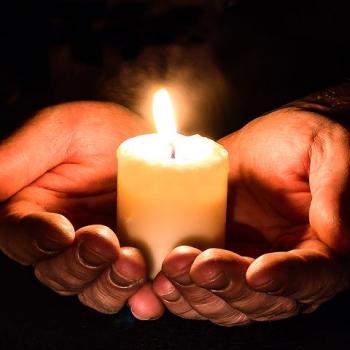Note: This is Part Three of a three-part series. Read Part One here and Part Two here.
Night and day
I cried aloud,
"Lord who shelters Shri,
O lord with red-lotus eyes!"
I whirled around in confusion,
and tears poured from my eyes
till my breath came in hot sighs.
Then all my evil deeds
fell away,
my happiness grew
and you stayed here inside me
day after day
O lord with wild hair. ~ Nammalvar [1]
You are the pitying, I the pitiful one,
you are the beneficent, I the one who begs;
I am notoriously fallen,
and you dash away mountains of sin.
You are the father of those without fathers,
and who could be more orphaned than I?
No one is so downtrodden—none more than I—
and you are the one who lifts the heavy weight.
You are all life, I am one life;
you are the master and I the servant;
You are mother and father, teacher and friend:
in every connection my lot is relieved.
We are bound by numerous ties, you and I,
so choose whichever you please.
Somehow, says Tulsi, oh you who send mercy,
let me find at your feet a refuge of peace. ~ Tulsidas [2]
One of the most daunting elements of the spiritual life is our limitations. These certainly include the fundamental metaphysical limitations—we are plotted on a graph, as it were, bound by time and space. We cannot be situated in two places at once or in two eras at once. We're stuck, as it were, limited in a most basic way. Moreover, we are also bound by death. The horizon of death becomes the primary existential context of our lives. We may ignore it, or deny it, but a vague unease over the fragility of life serves as an inchoate backdrop of our consciousness. We age, our skills diminish, as does our health. While the truth of old age may be lost on youths enjoying spectacular beauty and great health, these do not last. We need only to consider our parents and grandparents to be quickly reminded of our destiny.
But there is another set of limitations, psychological and moral. We might be well aware of our issues, but that awareness may be additionally vexing when our issues seem intractable and persistent. We may not see much change in our psyches and spirits, and perhaps there isn't much change. We feel troubled or conflicted by our ongoing neuroses or flaws. Even St. Paul appeared troubled by a recalcitrant tendency in his inner life to resist noble choices, "The good that I would do, I do not do."
Christian theologians attribute persistent moral limitation to concupiscence, a disposition or orientation to act in self-centered ways, typically driven by untoward desire. This may not be sin per se—at least that's a longstanding position in Catholic thought—but in the grip of such a disposition we stubbornly tend to act selfishly, injuring others and ultimately ourselves. And sin in this case might best be understood simply as harm, specifically actions which cause harm to others; such actions eventually tend to boomerang back as harm to oneself.
Hindus and Buddhists attribute our afflictive emotional states as the central axis of our moral crises, and our mental state itself is a product of choice and intentionality. This karmic syndrome—and karma in Sanskrit at its most basic means action—shapes a disposition leading to what psychologists call a repetition compulsion, the tendency to repeat unwholesome actions and find ourselves in an ongoing pattern of unhappy predicaments. But Hindus and Buddhists are clear on accountability: we get ourselves into our own moral messes; we have no one to blame but ourselves. One famous Buddhist tale addresses this in no uncertain terms. Yama, the Lord of the Dead, confronts a sinner, "The evil you have done is yours. It was not your done by your mother, or your father, or brother or sister or teacher. It was done by you, and you alone, and you alone shall reap the consequences." No blame shifting here!
The tendency to repeat selfish or unwholesome actions suggests, according to Hindu and Buddhist thought, that the actions groove, as it were, one's consciousness, making it easier to slip into a kind of automatic default. We become disposed or inclined to repeat the action. The repetition then begins to wire our consciousness, so that the pattern grows into a habituated tendency. Some contemporary psychologists speak similarly, holding for the mind's plasticity; in other words, the mind is characteristically malleable and subject to conditioning. A colloquial expression of this viewpoint—"neurons fire together, then wire together"—suggests that certain parts of the brain are aroused and activated in the desire-thought-action cycle making it much easier to repeat the sequence until it becomes a habit. Addictions are perhaps the most vivid, negative example of this cycle, but unwholesome emotions, such as anger or jealousy, can be habit forming as well. If the particular habit is "bad," well, we know that bad habits can be monumentally difficult to break. To encapsulate the notions here, let me paraphrase Mahatma Gandhi who had a keen sense of their dynamic: thoughts become words, words become actions, actions become habits, habits become values, and values become character.




